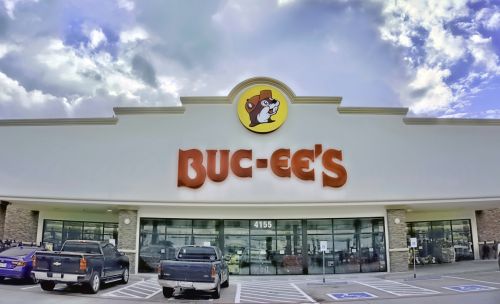Texas-based gas station and convenience store Buc-ee’s recently filed a trademark lawsuit against an individual who opened stores with allegedly similar branding. Known for its beaver mascot and distinct bold red lettering, Buc-ee’s alleges that the name and logo of its competitor, “Buky’s” is nothing more than a copy of the mega-chain’s well-known branding. Significantly, the legal action sheds light on several critical issues that commonly arise in trademark litigation — including trademark dilution and the likelihood of confusion.
What is Buc-ee’s Trademark Infringement Claim?
The Buc-ee’s trademark lawsuit was commenced by the 40-store chain against Saarim Damani, a business owner who opened stores named “Buky’s” with locations in El Campo and Rosenberg, Texas. While both chains are convenience stores that welcome highway travelers, Buc-ee’s claims that the similar red block letters on the Buky’s logo would likely confuse consumers and lead them to believe that the two stores were somehow associated.
To further support its argument, Buc-ee’s specifically makes reference in its suit to the slightly larger “B” and “S” in the Buky’s logo as proof of trademark infringement. In addition to trademark infringement, the complaint alleges trademark dilution, unfair competition, false designation of origin, and unjust enrichment.
In a statement allegedly made to the Houston Chronicle, Damani asserted that the stores are named for his childhood nickname, and he had not intended to copy the iconic Buc-ee’s logo.
Other Buc-ee’s Trademark Infringement Lawsuits
The trademark infringement lawsuit against Buky’s isn’t the first time the giant convenience chain has had to defend its brand from competitors seeking to capitalize on its well-known mark. In 2018, Buc-ee’s prevailed in an infringement lawsuit commenced against Texas barbecue restaurant Choke Canyon over similarities between its circular alligator logo and the famous Buc-ee’s beaver. Additionally, the chain settled a suit against Frio River Grocery in 2014, resulting in the smaller store having to surrender its beaver mascot.
Another notable Buc-ee’s trademark infringement lawsuit in the past decade includes an action commenced in 2013 against “Chicks,” a gas station that had attempted to sell an imitation of Buc-ee’s “Beaver Nuggets.” In the same year, Buc-ee’s also filed a complaint against Irv’s Field Store over its use of a similar logo and lettering.
Does the Buky’s Logo Constitute Trademark Dilution?
It is crucial for companies to defend their brands against trademark dilution. Distinct from the claim of infringement — which involves the likelihood that consumers would be misled — dilution can potentially occur even if customers would not be confused by the origins of the two marks. Rather, dilution refers to a competitor’s diminishing the value or distinctiveness of a famous mark through unauthorized use.
Under the federal Trademark Dilution Act, the owner of a famous trademark is entitled to injunctive relief against a party who uses a mark that would be likely to cause dilution — regardless of whether confusion or economic injury occurred. In a claim for dilution, a court would first consider whether the plaintiff has what would be considered a “famous” mark.
To determine whether a mark has the level of recognition required to be “famous,” a court would evaluate the following factors:
- The geographic reach of advertising and publicity of the mark, including the duration and extent
- The geographic extent of sales under the mark, including the amount and volume
- The extent of the mark’s actual recognition
- Whether the mark is federally registered
- All other relevant factors
Trademark dilution can arise in two ways — by “blurring” or “tarnishment.” Blurring occurs when the distinctiveness of a famous mark is weakened due to the likelihood that it may become associated with a similar mark. A trademark is tarnished when the brand’s reputation is harmed due to a perceived association with another company’s mark. A trademark may be tarnished when the subsequent company uses a similar mark in connection with inferior goods or services.
Although Buc-ee’s suit against Buky’s is ongoing, the chain potentially has a strong argument in support of trademark dilution, among its other claims. Notably, Buc-ee’s has been in existence for 40 years. It currently has locations in four states with plans to open stores in several more. Importantly, the chain’s beaver mascot with its prominent red lettering is arguably how consumers immediately identify the store. The logo is also featured on goods sold by the chain, including various souvenirs, t-shirts, and plush toys.
Contact an Experienced Trademark Attorney
The Buc-ee’s trademark lawsuit is a prime example of name and branding issues that can occur during the course of business ownership — and how vital it is to protect your brand against infringement that could harm your business and bottom line. It also reinforces the importance of conducting a thorough trademark clearance search to avoid potential risks and legal issues before they arise. Located in Ann Arbor, Michigan, the Trademark Lawyer Law Firm, PLLC, assists entrepreneurs and business owners with all aspects of trademark law to help them ensure their brands are adequately safeguarded from the competition. Contact us today to schedule a free 15-minute consultation.





